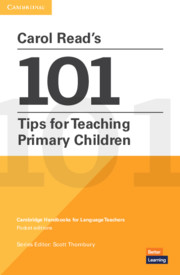Book contents
- Frontmatter
- Contents
- Acknowledgements
- Why I Wrote this Book
- A Getting Started
- B Core Skills
- C Classroom Management
- D Lesson Planning
- E Learning how to Learn
- F Storytelling
- G Playing Games
- H Values Education
- I Songs, Rhymes, Chants and Raps
- J Working with Projects
- K Intercultural Competence
- L Content-Based Learning (CLIL)
- M Thinking Skills
- N Vocabulary
- O Life Skills
- P Art, Craft and Design
- Q Mime and Drama
- R Inclusion and Diversity
- S Creativity
- T Adapting or Writing Materials
- U Listening and Speaking
- V Reading and Writing
- W Multiliteracies
- X Grammar
- Y Assessment
- Z The Last Word
- Glossary
- Selected Further Reading
- Index
D - Lesson Planning
Published online by Cambridge University Press: 28 October 2023
- Frontmatter
- Contents
- Acknowledgements
- Why I Wrote this Book
- A Getting Started
- B Core Skills
- C Classroom Management
- D Lesson Planning
- E Learning how to Learn
- F Storytelling
- G Playing Games
- H Values Education
- I Songs, Rhymes, Chants and Raps
- J Working with Projects
- K Intercultural Competence
- L Content-Based Learning (CLIL)
- M Thinking Skills
- N Vocabulary
- O Life Skills
- P Art, Craft and Design
- Q Mime and Drama
- R Inclusion and Diversity
- S Creativity
- T Adapting or Writing Materials
- U Listening and Speaking
- V Reading and Writing
- W Multiliteracies
- X Grammar
- Y Assessment
- Z The Last Word
- Glossary
- Selected Further Reading
- Index
Summary
Lesson planning can make the whole difference between a great lesson and a disaster. The more prepared you are, the more confident and relaxed you feel in class. Having a clear lesson plan also frees you up to be able to respond more spontaneously to children, and to deal more effectively with all the on-the-spot micro-management moments and decisions that arise in any lesson.
Metaphors are often helpful in exploring aspects of teaching and learning. In many ways, a lesson plan for teaching is like a recipe for cooking. With a recipe, you have a clear idea of the culinary result you are aiming for. With a lesson plan, you also need to have a clear idea of the learning outcomes that you wish to achieve. Both recipes and lesson plans also have a variety and balance of ingredients. In a recipe, the ingredients vary in quantity, texture, colour and flavour. In a lesson plan, they vary in materials, activity types, skills and interaction patterns. Both recipes and lesson plans include a method with clear stages and timing to produce a successful result. However, there's also room for creative adaptation and, depending on your confidence and experience, you can improvise freely.
When you start out, either cooking or teaching, it's usually a good idea to follow a detailed recipe or lesson plan as your principal guide. As you become more proficient, however, you may find that following certain procedures becomes so much part of your automatic, internalised behaviour that you no longer need to rely on quite so much detail.
My key tips for lesson planning are:
13 Plan in sand, not stone!
14 Focus on learning outcomes and success criteria
15 Aim for variety and balance
16 Plan in learning cycles
13 Plan in sand, not stone!
However much experience you have, you can never predict exactly how a lesson will go. For this reason, you always need to build flexibility into your lesson plan.
Lessons do not always go to plan. Activities may take more, or less, time than you had anticipated, and children may respond more, or less, enthusiastically to what you get them to do. Whatever the reasons for this, your first responsibility is to respond to the needs of the children rather than sticking rigidly to your lesson plan, and you need to have contingency plans in place to deal with this.
- Type
- Chapter
- Information
- Carol Read’s 101 Tips for Teaching Primary Children , pp. 16 - 20Publisher: Cambridge University PressPrint publication year: 2020



